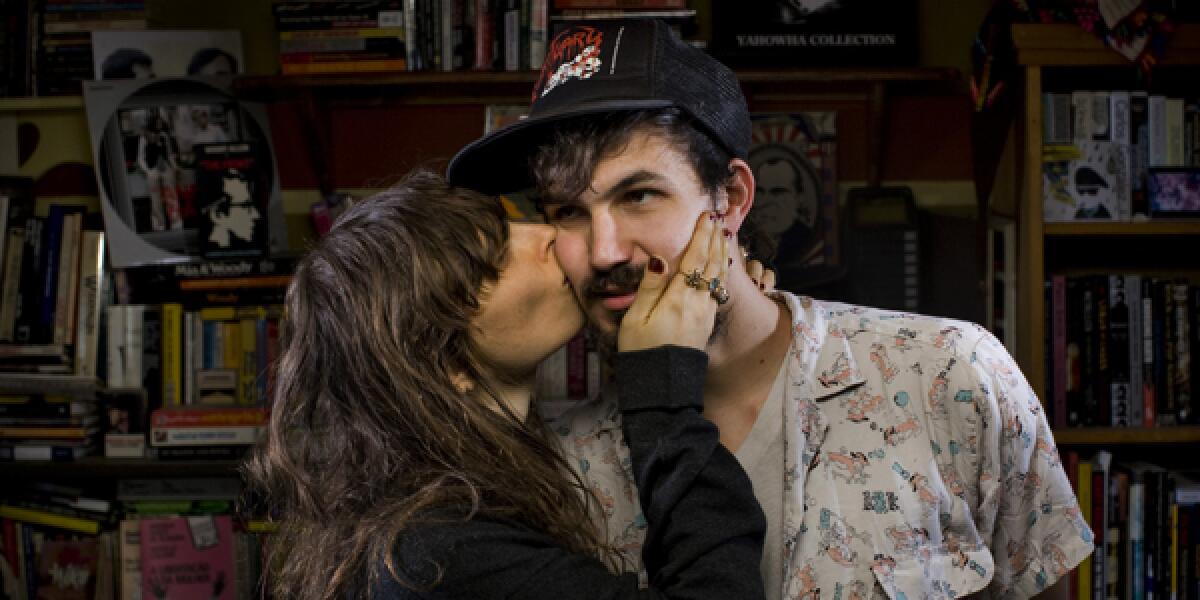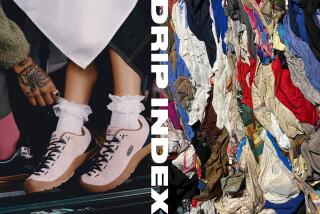L.A.’s string of indie labels succeeds with a jack-of-all-trades approach

- Share via
Part of a series of occasional articles.
Two weeks ago, rock band Arcade Fire landed the No. 1 spot on the Billboard charts with its third album, “The Suburbs.” For the band’s devoted fans as well as some online music prognosticators, hitting the top in a country hopelessly devoted to Taylor Swift, Justin Bieber and Lady Gaga looked to be one of those watershed moments when art trumps commerce and some sort of musical reboot occurs.
For North Carolina independent label Merge Records, which signed Arcade Fire in 2004 and released “The Suburbs,” the coup served as a reminder that a tectonic shift has taken place in the music business. No longer reliant on big-box stores to move physical CDs, homegrown imprints can focus their energies not on stuffing mailers and loading boxes but on pushing word of mouth, negotiating digital placement and marketing the music and the band.
Can’t get radio play? Earn YouTube and Vimeo hits. Locked out of Wal-Mart or Starbucks? Hit iTunes, Amazon and eMusic. Twitter and Facebook your way into people’s ears. Or better yet, get airplay on “Grey’s Anatomy” or “ CSI.”
Los Angeles has long been home to a vibrant indie scene, from Specialty and Pacific Jazz to Elektra and Dunhill through the punk of Slash, SST and Frontier to rap imprints Ruthless, Priority and Delicious Vinyl. Epitaph, the artist-run punk powerhouse, hit it big in 1994 with the Offspring’s six-times platinum album, “Smash,” and continues to have one of the most solid rosters of any label in the country, large or small.
With record sales dwindling and digital downloads the medium of choice — 62% of first-week sales of “The Suburbs” were digital — the music business is showing even more signs of flattening, a reality evident at labels throughout Southern California.
A few blocks south of the Capitol Records Tower, it begins: Twenty-odd independent labels, links in a chain, stretching from the eastern fringe of Hollywood to the far end of Pasadena. There’s Delicious Vinyl in Hollywood. Metal powerhouse Southern Lord overlooks Hollywood Boulevard in Hollywood. Plug Research shares space with the Dublab DJ collective at Santa Monica Boulevard and Vermont Avenue. Stones Throw lies at the convergence of Highland Park, Atwater Village and Mount Washington.
They exist in offices in living rooms, above record stores and crammed into garages. They are owned by young musicians, industry expats and enthusiastic collectors. They have ties to live music hotspots such as the Smell and Low End Theory, and they count among their rosters established acts, buzzing up-and-comers and hidden gems.
“I don’t want to hear some guy chomping on a cigar in Beverly Hills telling me it’s all gone pear-shaped,” said Jeff Castelaz, 37, co-owner of Silver Lake’s Dangerbird Records, which occupies a prominent spot near Sunset Junction. “The people who invented the paradigm and were trusted to run it let it run afoul. We have to fix it.”
Kevin Moo, 35, co-owner of Alpha Pup, a digital label and distributor headquartered downtown, sees the landscape as wide open: “There’s a tremendous opportunity for independent music right now,” he says. Alpha Pup’s roster of acts from the L.A. beat scene has helped establish the city as a world center for electronic music.
L.A.’s big-league independents — labels such as Dangerbird, Alpha Pup or Stones Throw — have discovered the beauty of diversification. They combine standard label operations with artist management, album mastering, merchandising, licensing and promotion. Their charge is to become the only entity a band needs to satisfy its commercial and financial needs, including record and MP3 sales, film and television placements and even T-shirts.
Dangerbird, founded in 2004, scored a recent win of its own. The label’s flagship band, Silversun Pickups, got a best new artist nomination for the 2010 Grammy Awards, a category historically filled by industry-vetted acts. SSPU lost to the Zac Brown Band, but it was still a victory for the label, which has sold 273,000 copies of the band’s 2009 album, “Swoon,” and 512,000 individual digital songs.
The label’s rock-centric roster includes other locals like Sea Wolf and Darker My Love and reformed major label acts like Hot Hot Heat. In 2009, when worldwide music sales dropped 10%, Castelaz saw his label’s gross “massively exceed” expectations.
At the other end of the spectrum is Eagle Rock’s Not Not Fun, a bedroom operation that’s never pressed more than 1,000 copies of any single release but still posted gains last year while supporting two people and paying artists. Britt Brown, 30, who founded Not Not Fun in 2006 with his wife, Amanda, 28, said he learned the importance of knowing the size of his customer base early on.
Britt Brown also attributed his imprint’s growth to a more incidental factor.
“They sell actual vinyl at Urban Outfitters now,” he said. “Trendy people I know own a record player and an iPod, and that’s it. As for the death of CDs, I’m not going to shed a tear.”
Scrappy DIY imprints like Brown’s typically don’t deal in CDs, the medium hit the hardest by illegal downloads. Instead, experimental or punk labels like Not Not Fun or Post Present Medium, founded by No Age drummer Dean Spunt and responsible for releases by, among others, Wavves, Silk Flowers and High Places, have long specialized in limited artifacts such as vinyl or cassettes.
They also don’t incur the same costs as larger labels. Brown said he spends an average of $1,500 per full-length release — for 500 copies that the label sells for $12 apiece — with 20% of the profit going to the band. He’ll put out as many as 20 such releases in a year from artists like Pocahaunted and Sun Araw, who are never signed to contracts.
By contrast, Stones Throw’s baseline for an average release from one of its 15 or so active artists is $50,000, with net gains split equally between label and client. Getting an album into the iTunes Store is only about $10 per title, which means access to wider audiences and a bang-up profit margin on stock that never runs out.
“The one key advantage major labels had this entire time was distribution,” said Alpha Pup’s Moo. “Your average chain music store could hold, max, 4,000 titles at once. Half of those were new releases, [90%] of which were major, with every indie label on Earth fighting for those remaining 400 slots.”
Moo’s business, which also includes handling worldwide digital distribution of older indie labels, such as Westbound (Funkadelic, Ohio Players), is capable of sustaining releases that sell as few as 200 units via iTunes. Alpha Pup’s setup is a modest empire of artist-run imprints too: seven digital sub-labels founded by cachet-carrying local names like Flying Lotus and Daedelus.
One of Alpha Pup’s most profitable avenues is licensing songs for film, television and commercial Web use. Label and artist alike see a payday when one of their tracks is synced to video, whether via a blockbuster movie like Universal’s “Repo Men” or a real estate clip made for YouTube. But the mother lode, Moo said, is in one of electronic music’s biggest licensees, CBS’ “CSI” franchise.
“We love ‘CSI,’” he said. “They licensed seven tracks from Nosaj Thing’s ‘Drift,’ practically every song on the album.” Legally, he couldn’t reveal a dollar figure but said that, generally speaking, “one license can pay the rent for a year. You can keep the lights on, literally.”
Stones Throw label manager Eothen “Egon” Alapatt told a similar story. Placement of an instrumental rap beat by producer Oh No in a recent Mountain Dew commercial beat CD sales 10 to 1 in terms of profit. Better still was the “dream deal” the label struck on behalf of rising R&B artist Aloe Blacc, whose “I Need a Dollar” is the theme song of HBO’s “How to Make It in America.” On top of the significant cash boon, “his record will actually sell,” said Alapatt. “The writing’s on the wall.”
The success of Moo’s low-overhead digital system has a brick-and-mortar benefactor as well. The Alpha Pup boss also runs Low End Theory, the weekly Lincoln Heights club night that’s been hailed here and abroad as providing electronic music with its next big evolutionary step. Along with all-ages punk venue the Smell — which helped vault such artists as No Age, Mika Miko and Abe Vigoda into the limelight — this Eastside hub has come to represent something of a renaissance for independent artists in L.A.
Fans of emerging music are accustomed to discovering new acts online, helping to drive business to these labels. And it doesn’t hurt that there seems to be an abundance of great music in those same labels’ backyard. To wit: Stones Throw’s tandem 2009 signings of local soul sensation Mayer Hawthorne and Leimert Park funk astronaut Dâm-Funk; the blog-heralded rise of psych-pop acts like Echo Park’s Nite Jewel and Eagle Rock’s Best Coast; and, of course, that the biggest band in Silver Lake, Silversun Pickups, made it onto the biggest music award show in the world.
“I don’t think we would’ve had any chance of success if we weren’t on a label like Dangerbird,” said SSPU singer Brian Aubert. “They believe in careers, and the long haul — something that majors used to believe in. They stuck with us when most people wouldn’t have.”
That the traditional recording industry is rooted in L.A. has undoubtedly contributed to the local indie uprising. Both Moo, who worked for Sony until 2007, and Castelaz, a longtime music manager, said they had the opportunity to witness firsthand what not to do when it came time to launch their labels. The main lesson: to keep the operation at a reasonable scale, employing, say, a staff of 10 instead of thousands.
“There are going to be far fewer skyscrapers in the music business,” said Castelaz, “and many, many more squat buildings that are filled with purpose.”
More to Read
The biggest entertainment stories
Get our big stories about Hollywood, film, television, music, arts, culture and more right in your inbox as soon as they publish.
You may occasionally receive promotional content from the Los Angeles Times.










